#françois méchali
Explore tagged Tumblr posts
Photo
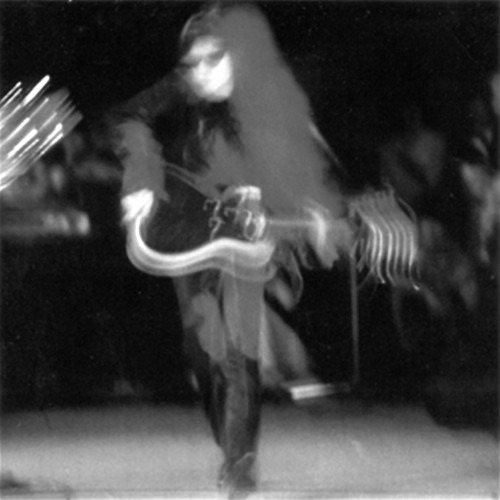


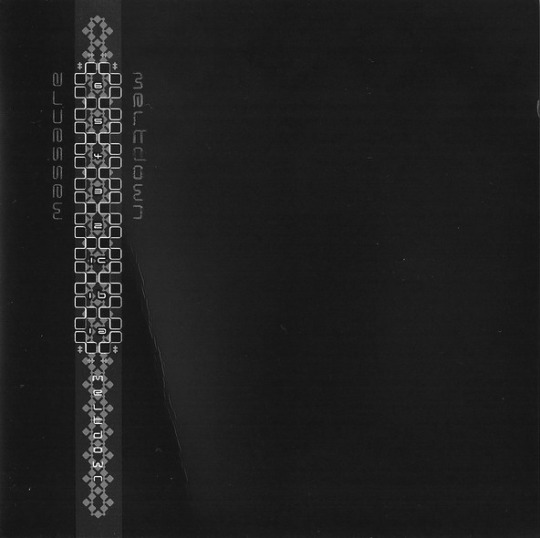

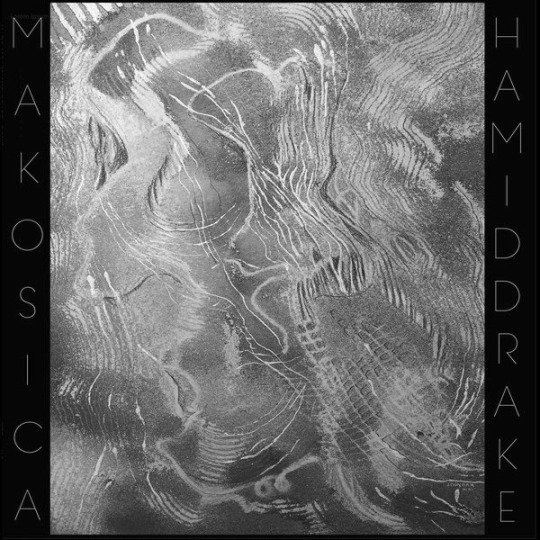
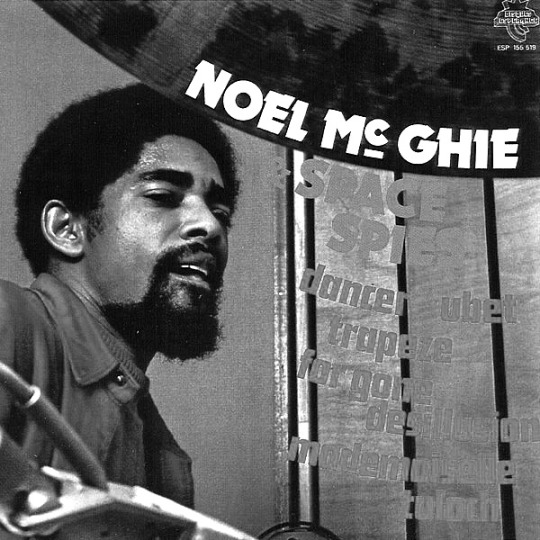
POST-POST-SCRIPTUM 1065
24 - QUE POURRAIT BIEN RACONTER CE PROJET ?
Et s’il s’agissait d’un livre abordant les rapports entre jazz et rock (et vice-versa) d’une manière enfin inédite ?
#lost aaraaf#keiji haino#john martyn#gérard marais#françois méchali#massacre#material#mako sica#noel mc ghie#philippe robert#jazz-rock#merzbo derek#bertrand gauthier#hamid drake
7 notes
·
View notes
Photo







Cuando Tejero y sus compinches entraron en el Congreso en el 81 teníamos clase de matemáticas. Mercedes, la conserje, estaba oyendo la radio, se asustó y tocó el timbre unos cinco minutos antes de la hora. Gran jolgorio juvenil. No pensaba entonces que iba a poder asistir a un segundo golpe de estado por la tele. El tiempo se enrosca de forma extraña.
#joseph bodin de boismortier#le concert spirituel#hervé niquet#gaëlle méchaly#marie-louise duthoit#françois-nicolas geslot#till fechner#alain buet#renaud delaigue#arno guillou#glossa#música#music#mis discos
1 note
·
View note
Photo

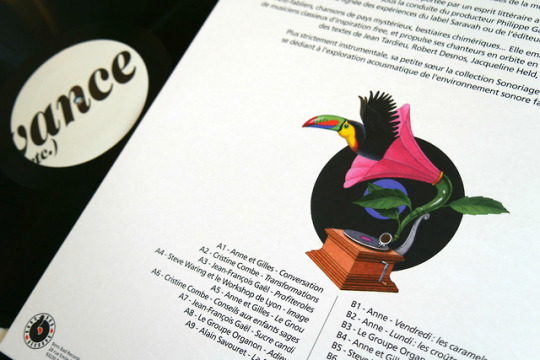
OUT NOW:
CHEVANCE (etc.) - Outremusique pour enfants / 1974-1985 Born Bad records - BB112 - LP / CD / Digital
CHEVANCE (etc.) - Outremusique pour enfants 1974-1985 by various
"France, carrefour des années 1970: la collection Chevance dynamite les codes de la musique pour enfants. Mêlant folk prospectif et jazz à l'avant-garde, portée par un esprit littéraire affirmé, elle bâtit son catalogue hors-normes sous la conduite du producteur Philippe Gavardin, dans la lignée des expériences du label Saravah ou de l'éditeur iconoclaste Harlin Quist. Anti-fabliers, chansons de pays mystérieux, bestiaires chimériques.... Elle embarque à son bord toute une bande de musiciens classieux d'inspiration free, et propulse ses chanteurs en orbite en exploitant tout le potentiel fantasque des textes de Jean Tardieu, Robert Desnos, Jacqueline Held et bien d'autres. Plus strictement instrumentale, sa petite sœur la collection Sonoriage parachève l'entreprise, se dédiant à l'exploration acousmatique de l'environnement familier des plus jeunes."
Avec: Cristine Combe / Anne et Gilles / Steve Waring et le Workshop de Lyon / Jean-Louis Méchali / Jacques Cassard / Jean-François Gaël / Bernard Baschet / Alain Savouret / Anne H. Bustarret / Jean Querlier / François Méchali / Le Groupe Organon / Jean-Louis Bucchi / Jean-François Canape / Jean-Charles Capon / Christian Rollet / Alain Gibert / Louis Sclavis / Naomi Moody...
Produit par Born Bad / Compilé par Radio Minus
INFOS / ORDERS: https://shop.bornbadrecords.net/album/chevance-etc-outremusique-pour-enfants-1974-1985
1 note
·
View note
Photo

Știri: Legendarul 3 F Trio: François Couturier, François Méchali, François Laizeau, în concert la Cluj și la București (3 și 4 decembrie 2018) O raritate pentru amatorii de jazz și de muzică clasică deopotrivă – pentru un început de iarnă cu gândul la tărâmuri calde și liniștite…
0 notes
Photo
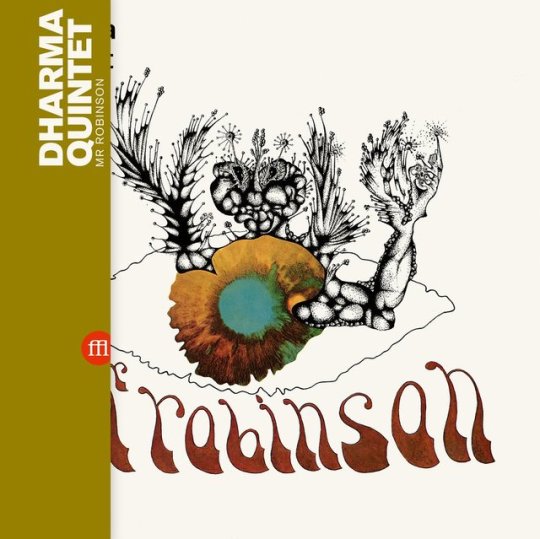
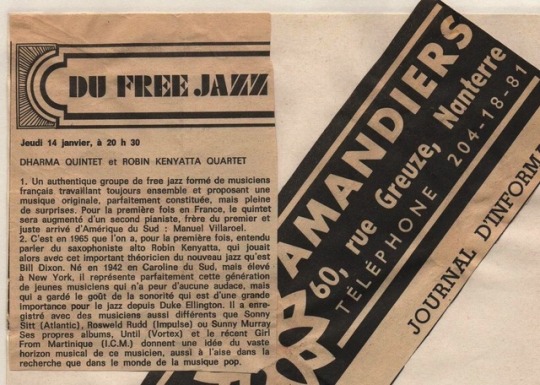
POST-SCRIPTUM 884
DHARMA QUINTET, Mr Robinson, SouffleContinu Records
Accordée à Jazz Magazine par le Dharma, une interview du début des années 1970 précise d’une même voix, au nom du collectif : « Nous cherchons à obtenir, en free, une cohésion semblable à celle des rythmiques bop, une cohésion sur quelque chose qui ne soit pas le tempo, mais qui ressemblerait pourtant au tempo. Une sorte de pulsation sous-tendue. »
De ces considérations témoigne d'emblée Mr Robinson, premier disque d'un Dharma Quintet au sein duquel la vie en communauté s'est imposée, histoire d'augmenter d'un cran supplémentaire la cohésion recherchée. Du coup, ses membres jouent de la musique ensemble quotidiennement, tentant des choses remises sur le tapis jour après jour ; ils en écoutent aussi, sur disques, avec une préférence pour le free jazz certes, mais sans pour autant oublier Miles Davis période électrique, notamment pour les claviers de Keith Jarrett et Chick Corea. À quoi s'ajoute une ligne de conduite esthético-politique basée sur le refus de la hiérarchie, et un désir d'échapper à toute forme d'académisme sclérosant…
C'est sur ces bases que Jef Sicard et Gérard Coppéré (saxophones, flûte, clarinette basse), Patricio Villaroel (piano électrique et acoustique), Michel Gladieux (basse) et Jacques Mahieux (batterie) constituent la première incarnation d'un collectif soudé par des intentions structurées. Car chez le Dharma, l'improvisation individuelle ne peut s'envisager sans cadre clairement défini, même hors-tempo : en résulte une cohésion bénéfique, et des instants de toute beauté nés d'unissons frissonnants et à l'origine d'ambiances littéralement habitées. Par endroits, certain attachement à la modalité relierait même Mr Robinson au jazz spirituel d'alors, sans compter qu'Eric Dolphy parait planer sur ce disque comme une ombre tutélaire bienveillante. En France, pareil souci de cohésion se retrouvait aussi dans le Cohelmec Ensemble, aux préoccupations voisines, à tel point que leur bassiste, François Méchali, finit par rejoindre le Dharma : aucune trace phonographique à ce jour malheureusement, si ce n'est dans les mémoires.
En quintette, avec des renouvellements de personnel toutefois, le Dharma enregistra trois disques (il en existe également un en trio, sous le nom de Dharma Trio), tous aussi fondamentaux (le Dharma accompagna aussi, et de bien belle manière, les chansons de Jean-Marie Vivier et Colette Magny). Individuellement, ses membres enregistrèrent avec des musiciens de passage (notamment Anthony Ortega, Dave Burrell) et participèrent à d'autres formations essentielles dont Machi Oul et Full Moon Ensemble.
--
In an interview with Jazz Magazine in the early 1970s, Dharma, as a collective voice, outlined their method: “we try to reach, within free jazz, the same sort of rhythmic cohesion as in Bop, a cohesion based not exactly on tempo, but something which feels like tempo. A kind of underlying pulse”.
Evidence of these ideas can be heard immediately on listening to Mr Robinson, the first album by the Dharma Quintet, for whom community living seemed obvious, in order to add to the aforementioned cohesion. Through this, the group members played together on a daily basis, trying out things which were worked on day in, day out. They were also listening to a lot of records, with of course a preference for free jazz, but not forgetting Miles Davis in his electric period, notably for the keyboards of Keith Jarrett and Chick Corea. To which should be added esthetical-political concerns based on a refusal of hierarchy, and a desire to escape from a restrictive academic approach…
It was within this framework that Jef Sicard and Gérard Coppéré (saxophones, flute, bass clarinet), Patricio Villarroel (electric and acoustic piano), Michel Gladieux (bass) and Jacques Mahieux (drums) formed the first version of a collective united by structured intentions. Because, within Dharma, individual improvisation cannot be envisaged outside of a clearly designated framework, even non-tempo. The result is a beneficial cohesion, and moments of great beauty born of a collective excitement and giving rise to ambiances which seemed almost possessed. The use of modes could seem to link Mr Robinson to the spiritual jazz of the past but that is without taking into account the fact that the benevolent spirit of Eric Dolphy seems to watch over this album. In France, a similar desire for cohesion could be found in the Cohelmec Ensemble, who had parallel preoccupations, to the point where their bassist, François Méchali, ended up by joining Dharma: there is unfortunately no recorded trace of this, just the memories.
As a quintet, with however some personnel changes, Dharma recorded three albums (there is also one as a trio, under the name of Dharma Trio), which are all of fundamental importance (Dharma would also accompany, and to great effect, the songs of Jean-Marie Vivier and Colette Magny). Individually, the members would record with musicians passing through (notably Anthony Ortega, Dave Burrell) and participated in other key groups including Machi Oul and Full Moon Ensemble.
#dharma quintet#miles davis#keith jarrett#colette magny#full moon ensemble#dave burrell#anthony ortega#philippe robert#lenka lente#agitation frite 2#agitation frite#cohelmec ensemble#françois méchali#eric dolphy#chick corea#patricio villaroel#michel gladieux#jacques mahieux#jef sicard#gérard coppéré#robin kenyatta#post-scriptum#merzbo derek
9 notes
·
View notes
Photo


POST-SCRIPTUM 881
DHARMA QUINTET, Archipel, SouffleContinu Records
« Do your own music! » conseillait Albert Ayler, message clairement reçu en France ! Cohelmec Ensemble, Workshop de Lyon et Dharma Quintet, trois formations proches dans l'esprit, en ont illustré chacune à leur manière le principal précepte local : prendre ses distances d'avec le free jazz américain. Encore qu'en ce qui concerne le Dharma, l’approche, voulue communautaire afin (dixit) d’échapper à tout académisme (les musiciens habitent ensemble, répètent inlassablement, achètent collectivement le matériel nécessaire), évoque celle de l’A.A.C.M. avec lequel le groupe se sent des affinités, mais revues et corrigées par Gong malgré une profonde admiration pour Anthony Braxton rencontré à Paris au début des années 1970 ! Mai 68 est passé par là, et l'heure est encore aux remises en question contestataires : aucun leadership n'est envisageable et le personnel est susceptible d'être modifié au gré des enregistrements (sur Archipel, un nouveau batteur fait ainsi son apparition ; cependant, aucun disque ne témoigne à ce jour de la formation avec Jean Querlier et François Méchali).
Tout comme le précédent End Starting, Archipel est un disque construit, mêlant free rock et free jazz à l'européenne dans d'incessantes explosions collectives basées sur des improvisations abruptes et contrastées. La plupart du temps, piano, guitare et saxophone s'entrelacent sur des rythmiques d'enfer, tandis que l’électricité fait feu de tous bois. Rétrospectivement, d’aussi saisissantes combinaisons de timbres, évoquant par endroits les passages free de Cinemascope de Joachim Kühn avec Toto Blanke, font regretter l’avortement prématuré du Dharma en 1974, sa modernité n'ayant déjà rien à envier aux avancées ultérieures des groupes de Paul Bley avec guitare (Pat Metheny, John Scofield), ou de Om sur Rautionaha (pour les alliages Urs Leimgruber / Christy Doran), le piano électrique de Patricio Villaroel apportant toutefois au Dharma une touche étonnamment singulière bien qu'héritée des recherches de Chick Corea chez Miles Davis. Sans compter çà et là, quand les choses s'accélèrent, une certaine violence incisive propre au Dharma Quintet, et un son aussi dense que celui de On The Corner de Miles Davis, ou Stark Reality, la formation de John Abercrombie à la même époque grosso modo. Quoi d'autre pourrait être approximativement proche du Dharma Quintet au même moment ? Emergency, quintette ayant lui aussi sévi et enregistré en France, entre autres composé de Glenn Spearman au saxophone, Boulou Ferré à la guitare et Takashi Kako au piano électrique. Voire Masabumi Kikuchi au Japon.
Au même titre que le Cohelmec Ensemble, le Workshop de Lyon, le Full Moon Ensemble, Perception, Armonicord ou le Michel Portal Unit, le Dharma Quintet s'est imposé comme une des plus importantes formations du free jazz tel qu'il se pratiquait en France au début des années 1970.
--
“Do your own music!” was Albert Ayler’s advice, received loud and clear in France! Cohelmec Ensemble, Workshop de Lyon and the Dharma Quintet, three groups close in spirit, which would each illustrate in their own way a local principle: to get some distance from American free jazz. As far as Dharma is concerned, the community-based approach was put in place to escape (they stated) from any academism (the musicians lived together, rehearsed endlessly together, and collectively purchased the necessary material together). This may draw comparisons with the l’A.A.C.M. with whom the group felt a certain affinity, but they were also influenced by Gong, in spite of a deep admiration for Anthony Braxton who they met in Paris at the beginning of the 1970s! The events of May 68 were fresh, and protest was still in the air: no leadership structure was possible, and personnel could change with each recording (on Archipel, a new drummer makes an appearance; however, there is no recorded trace of the group with Jean Querlier and François Méchali).
Like its predecessor End Starting, Archipel is a constructed album, mixing free rock and European free jazz in a series of collective explosions based on abrupt and contrasting improvisations. For much of the time, piano, guitar and saxophone intertwine over intense rhythms, with everything and anything being electrified. Retrospectively, such remarkable timbral combinations, evoking sometimes the freer passages of Cinemascope by Joachim Kühn with Toto Blanke, make the demise of Dharma in 1974, even more regrettable. Their modernity has nothing to envy of the later advances of Paul Bley with guitar (Pat Metheny, John Scofield), or of Om on Rautionaha (for the alliance of Urs Leimgruber/Christy Doran), Patricio Villarroel’s electric piano adding a nonetheless surprisingly singular touch to Dharma, inherited of course from Chick Corea’s work with Miles Davis. This is without mentioning a kind of incisive violence when things speeded up, which was unique to the Dharma Quintet, or a sound as dense as that of On The Corner by Miles Davis, or Stark Reality, John Abercrombie’s group from around the same period. Who else could seem approximately close to the Dharma Quintet at the same time? Emergency, a quintet which had played and recorded in France, including, among others, Glenn Spearman on saxophone, Boulou Ferré on guitar and Takashi Kako on electric piano. Masabumi Kikuchi in Japan also deserves a mention.
Along with the Cohelmec Ensemble, the Workshop de Lyon, the Full Moon Ensemble, Perception, Armonicord or the Michel Portal Unit, the Dharma Quintet stand out as one of the most important examples of free jazz as it was played in France at the beginning of the 1970s.
( Agitation Frite 1, 2 & 3, par là )
#dharma quintet#cohelmec ensemble#workshop de lyon#armonicord#philippe robert#agitation frite#agitation frite 3#lenka lente#full moon ensemble#michel portal#miles davis#stark reality#john abercrombie#emergency#takashi kako#glenn spearman#masabumi kikuchi#boulou ferré#albert ayler#gong#anthony braxton#jean querlier#françois méchali#joachim kühn#toto blanke#post-scriptum#merzbo derek#souffle continu records
5 notes
·
View notes